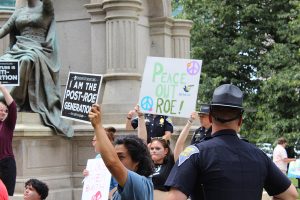Subscriber Benefit
As a subscriber you can listen to articles at work, in the car, or while you work out. Subscribe NowIt’s been a year of legal battles for both sides of the abortion issue in Indiana, with a struggle in the courts still playing out as the state’s near-total ban takes effect for the second time.
Earlier this month, a split Indiana Supreme Court denied the American Civil Liberties Union of Indiana’s petition for rehearing on its privacy claim against the ban, which prohibits abortion except in limited cases of rape, incest, fatal fetal anomaly, or to protect the life or health of the mother.
The justices in June lifted an injunction against the abortion law, known as Senate Enrolled Act 1. Then on Aug. 21, the high court declined rehearing, with Justice Christopher Goff once again dissenting, as he had done in June.
Indiana Chief Justice Loretta Rush concurred in both decisions, but she wrote separately to the denial of rehearing to express her concerns about SEA 1’s potential impact on Hoosier women.
“… I am deeply concerned about Senate (Enrolled Act) 1’s impact on Hoosier women’s constitutional right to seek medical care that is necessary to protect their life or to protect them from a serious health risk. And I am likewise concerned about the law’s impact on healthcare providers who must determine whether to provide that care and potentially expose themselves to criminal penalties and professional sanctions,” Rush wrote. “But Plaintiffs have not properly put these concerns before us.”

In Goff’s dissent to the denial of rehearing, he reiterated the concerns he expressed in his dissent to the court’s June opinion, in which the majority justices ruled that SEA 1 doesn’t violate Article 1, Section 1 of the Indiana Constitution. However, the court did find that the Indiana Constitution protects a woman’s right to an abortion to protect her own life.
“Unless our colleagues in the General Assembly act to address these deficiencies, the State must be enjoined from enforcing Senate (Enrolled Act) 1 in ways that prevent women from seeking necessary medical aid,” he wrote. “No one yet knows the precise contours of the life and heath protections guaranteed by the Indiana Constitution. But, for the sake of the lives and health of Hoosier women, our healthcare professionals and our justice system need to know as quickly as possible. Having declared the right of a woman to protect her health, this Court should not now let that right go unprotected.”
What’s the reaction?

Elected officials and advocates on both sides of the abortion debate reacted strongly to the court’s decision denying rehearing.
Indiana House Democratic Leader Phil GiaQuinta, D-Fort Wayne, pointed to the U.S. Supreme Court opinion in June 2022 overturning the federal right to abortion that had been declared in Roe v. Wade.
“The fear and dread felt by so many as Roe was overturned has been actualized today,” GiaQuinta said in a news release. “Abortion is illegal in our state with very narrow exceptions. Doctors now risk penalties for using their best judgment to provide life-saving care, and Hoosier women and girls will pay for this with their health and their lives.”
Indiana Attorney General Todd Rokita, a staunchly anti-abortion Republican, took the opposite view in a post to Twitter/X after the high court’s ruling.
“My office promised to defend Indiana’s pro-life law, and we have done that every step of the way,” the post said. “Today, the Indiana Supreme Court certified its opinion rejecting a constitutional challenge to Indiana’s pro-life law, which protects the lives of innocent, unborn babies. This is great news for Hoosier life and liberty. We defeated the pro-death advocates who try to interject their views in a state that clearly voted for life.”
Likewise, Indiana Right to Life President and CEO Mike Fichter said the Indiana Supreme Court’s decision to deny rehearing was a “victory for unborn babies throughout Indiana.”
“Our state is sending a message to the rest of the nation that when we stand together with love and compassion in protecting unborn babies and supporting pregnant mother(s), we save lives, improve lives and support a national culture that values life,” Fichter said in a statement posted to the Indiana Right to Life website. “… This is truly an historic day, and we are so thankful to the tens of thousands of Hoosiers who worked so hard for over 50 years to bring this day about. And we know there are many opportunities ahead for Indiana to do even more in caring for babies and pregnant mothers.”

Conversely, the ACLU of Indiana, which represented the plaintiffs before the high court, said the decision to deny rehearing was a “dark day in Indiana’s history.”
“We have seen the horrifying impact of bans like this across the country, and the narrow exceptions included in this extreme ban will undoubtedly put Hoosiers’ lives at risk,” Jane Henegar, the outgoing executive director of the ACLU of Indiana, said in a statement. “We will continue to fight in court to clarify and expand upon the current exceptions. Every person should have the fundamental freedom to control their own body and politicians’ personal opinions should play no part in this personal decision.”
What’s the impact?

Sen. Sue Glick, R-LaGrange, authored SEA 1 during the 2022 special legislative session. She said the intent behind SEA 1 is already bearing out.
“The battle isn’t over, but it appears to be, so far, reducing the numbers of the procedures,” Glick said. “I’m sure there’s some procedures going forward that fall under the exceptions are in the bill, but overall, I think the numbers are down substantially and people are seeking alternatives.”

Still, Glick acknowledged that “the wheels of justice grind slowly, but they grind exceedingly fine.”
“It takes a while. It has to move through the process,” she said.
Glick also acknowledged that there will be Hoosiers who will choose to travel out of state for abortions or who will choose different methods of birth control.

Indiana University Robert H. McKinney School of Law professor Jennifer Drobac told Indiana Lawyer that the high court’s ruling is plain. She also said she tells her students that yesterday’s dissent could be tomorrow’s concurrence.
“I do think it represents more of what Hoosiers think,” Drobac said of Goff’s dissent. “And I think so does (Chief) Justice Rush’s concurring opinion and her expression of concern for the lives and health of Hoosier women or people who become pregnant.”
Drobac added that Rush’s concurrence seemed to suggest that the ACLU should have returned to the court with a different argument on the privacy claim under Article 1, Section 1.
“The messaging suggests that they wanted the ACLU to come back and say, ‘OK, well, this law is merely unconstitutional because it doesn’t have adequate provisions for the life and health of the pregnant person,’” Drobac opined. “And it didn’t do that because that basically gives up the argument that this law is, in total, unconstitutional.”
What’s next?
While the constitutional claim against SEA 1 seems to be back at the drawing board, a second ACLU complaint lodged against the state’s abortion law is proceeding under the theory that the law violates Indiana’s Religious Freedom Restoration Act.
The Marion Superior Court entered a second injunction against SEA 1 on RFRA grounds in December, and that issue is currently before the Court of Appeals of Indiana. The state is also appealing the certification of the RFRA case as a class action.
After the Supreme Court handed down its decision on SEA 1 in June, the ACLU asked the Marion Superior Court to clarify whether the RFRA injunction applies only to the original plaintiffs in that case, or to the whole class.
The state argued that the court didn’t have subject matter jurisdiction to clarify the preliminary injunction given that the case was already before the COA. Marion Superior Judge Heather Welch agreed with the state and denied the ACLU’s motion for clarification on subject-matter jurisdiction grounds.
In her order, Welch noted that the issues the plaintiffs brought are the same ones they will be arguing before the Court of Appeals in December.
The case is currently scheduled to be argued before a panel of Court of Appeals judges at 10 a.m. on Dec. 6 in the Indiana Supreme Court courtroom.•
Please enable JavaScript to view this content.

